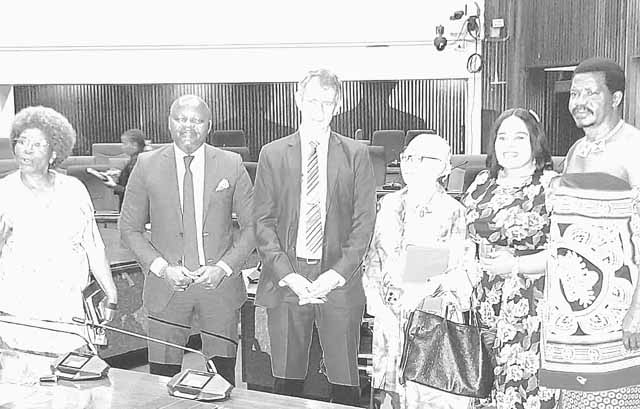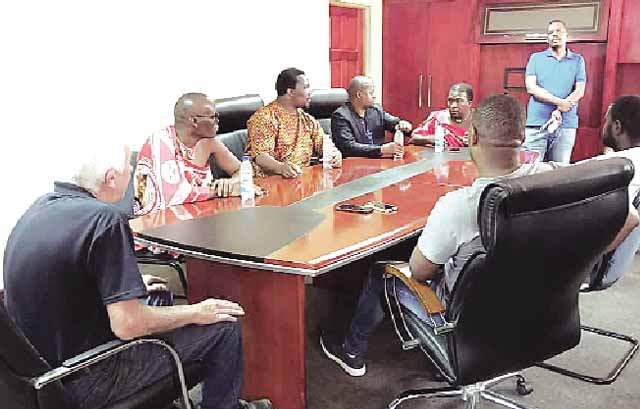By THEMBEKA DLAMINI | 2018-05-13
The closure of parliament is looming following the announcement of elections’ registration commencing today and senate looks set to work extra hours in order to leave their in-tray empty when they leave.
Elections’ registration period commences today and will end June 17.
Explaining that they were working against time, Acting Senate President Ngomuyayona Gamedze said they were however not going to compromise quality in a rush to complete their duties. He also emphasised that His Majesty King Mswati would pronounce the end of their term.
“All due processes will be properly followed with senators expected to apply their minds soberly as work will not be hastened simply to rush Bills,” he said.
He was adamant that they would not do a shaddy job in an attempt to pass them as they wanted to make sure that anything that comes out of the house remains beneficial to the country’s future generations and does not have to return to the successive parliament.
Gamedze stated that tomorrow, senate is expected to sit and look at the remaining six bills as the Persons with Disabilities Bill, 2016 has been added to the initial five which include the Sexual Offences and Domestic Violence (SODV) Bill, Prevention of Organised Crime Bill, Witness Protection Bill as well the Criminal Procedure and Evidence Amendment Bill.
Of note, the SODV Bill has been deliberated since more than eight years ago and advice by Senate President Gelane Zwane in 2011 that it would have to be scrutinised by a council of chiefs who are required by Section 215 of the country’s Constitution and have not been followed to date.The council of chiefs, according to the Constitution, is supposed to advise His Majesty the King on matters bordering on Swati Law and Customs. Among other things, the council of chiefs will also be responsible for performing it’s functions as required by Section 115 of the very same Constitution. In this section, the council is required to advise the King when legislations supposed to be enacted by Parliament are debated.
The function of the council is to advise the King with an intention to ensure that Swati customs are not violated by the legislations. The council is also expected to perform any other functions as required by the Constitution or any other law of this country. Members of the council of chiefs, according to Section 251 (4) of the Constitution, shall be divided into three classes of four each.
On enactment, the Prevention of Organised Crime Bill would ensure that racketeering offenders, once convicted, would be liable imprisonment for a period not exceeding 50 years or fines up to E200 million or both. Racketeering, in terms of the proposed law, means the act of operating an illegal business or scheme to make profit, perpetrated by an organised group.
Upon the passing of the Bill by parliament and subsequent enactment into law by His Majesty the King, a sentence imposed interms of this section would not be subject to postponement or suspension in terms of the Criminal Procedure and Evidence Act, 1938, or its successor. In terms of the Bill, offences relating to racketeering activities include any person who, within the country or elsewhere, receives or retains any property derived, directly or indirectly, from a pattern of racketeering activity.
A person also commits the offence, if they are investing in property, in the acquisition of interest in, or the establishment or operation or activities of any enterprise.
Section 3 (4) of the Bill states that any person who, within the country or elsewhere, acquires or maintains, directly or indirectly, any interest in or control of any enterprise through a pattern of racketeering activities commits an offence.
The Persons Living with Disabilities Bill of 2015, is linked to the constitution Section 14 (3) which provides for the protection and promotion of fundamental rights and freedoms of people of whatever disability. Section 30 (2) further provides that Parliament has to enact laws for the protection of persons living with disabilities in order to enable them to live a fulfilling life.
The country ratified the United Nations Conventions on the Rights of Persons Living with Disabilities in 2012. The main aim of the convention was to ensure the full and equal enjoyment of all human rights by people living with disabilities.
Hearings for the Witness Protection Bill No.5 of 2016 were expected to have completed on Friday. The Bill’s objectives include, among other things, to establish witness protection in the country by making provisions for the protection of witnesses of serious offences who are under threat.
The Bill is purposed to encourage members of the public to come forward to give evidence as witnesses in criminal cases by offering effective protection to them and provide for the appointment of a director for the witness protection programme and witness protection officers.
share story
Post Your Comments Below

SENATORS have blown the whistle on alleged corrupt tendencies at the treasury and revenue d...
Every year, the global community comes together for 16 Days of Activism against gender-based viol...
Ask anyone who has been a victim of the so-called ‘Facata scammers’ about their exper...

ABOUT 100 government vehicles, which developed mechanical faults are ‘rotting’ at Mat...
All material © Swazi Observer. Material may not be published or reproduced in any form without prior written permission.
Design by Real Image Internet